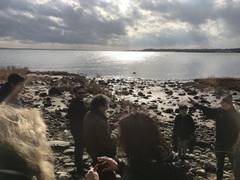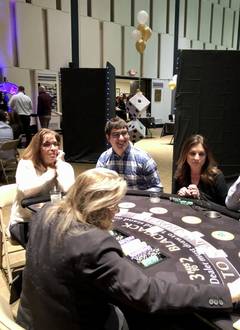Vayikra/Shabbat Zachor 5779: Fighting Amalek Today
03/17/2019 05:37:37 PM
Mar17
| Author | |
| Date Added | |
| Automatically create summary | |
| Summary |
“Remember what Amalek did to you on your journey, after you left Egypt�"how, undeterred by fear of God, he surprised you on the march, when you were famished and weary, and cut down all the stragglers in your rear. Therefore, when the LORD your God grants you safety from all your enemies around you, in the land that the LORD your God is giving you as a hereditary portion, you shall blot out the memory of Amalek from under heaven. Do not forget!”
We read these words this morning as part of the special maftir for this Shabbat, the Shabbat of memory before Purim. These words are a sobering prelude to the frivolity of Purim. Over these days we tell three chapters of a still-unfinished story. The first is the attack of Amalek on our people just as we emerged from Egyptian slavery. The second was today's Haftarah, which tells of the war between King Saul and the Amalekites, fulfilling this commandment to avenge that earlier attack. And the third is the story of Purim, the story of the foiled plot of Haman, considered to be a descendent, literally and metaphorically, of Amalek.
Amalek is a particular people in the Bible, but it is also a particular quality, a particular way of going about in the world. Our sages over the generations have made very clear that we cannot know today who, if anyone, the descendants of Amalek are. So we cannot literally fulfill the commandment to blot them out even if we wanted to. But the spirit of Amalek, I would suggest, nonetheless remains with us today.
What is that spirit? Don Isaac Abarbanel, the rabbi and Jewish political leader who lived through the expulsion from Spain in 1492, identified four characteristics of Amalek, four reasons why the Torah considers their behavior to be especially odious.
The first is that their attack on the people Israel was baseless. Israel was not passing through their territory and was not trying to conquer their territory. Nor did Israel in any way attack them. Amalek had no legitimate reason to engage in battle.
The second is that Amalek did not warn the Israelites of the upcoming attack, as, Don Isaac claims, it is customary for kings to do. Instead, they attacked by surprise, on the way, giving Israel no opportunity to prepare to defend themselves. All the more so, the people had just left slavery and were in no way prepared to engage in war.
The third is that Amalek did not confront Israel head on, but attacked them in the rear, where the weakest people were straggling along. Furthermore, their attack came when the people were weak and weary and in no way able to defend themselves. So Amalek's attack was an act of cowardice.
The fourth is that Amalek had no reverence for God. They did not respect any power other than their own destructive power. This led them to think nothing of attacking a fearful people in a vulnerable moment for no reason. Amalek sinned both against the people Israel and against God.
So we get the picture. Amalek represents the cruel impulse to attack the weak and the vulnerable, disdain for the normal rules about how to resolve conflicts, and a callous disregard for human life and its sanctity.
This spirit of Amalek remains very much with us. Sometimes it is directed against Jews, as we saw in Pittsburgh last year. In that attack it was precisely the most vulnerable members of the Jewish community�"the elderly and people with disabilities�"who were murdered, along with those who gave their own lives to try to save others. It was an attack for no legitimate reason, but simply an expression of that hateful, destructive, and cruel impulse.
Pittsburgh was on my mind on Friday morning when I woke up to the news from New Zealand, of 49 Muslims gunned down at prayer. Yet another senseless mass shooting inspired by hate. Yet another cowardly act of violence against innocent, defenseless people. Yet another manifestation of how easily hatred of minorities can spread and metastasize online.
I remembered how much it meant after Pittsburgh when non-Jews of all kinds reached out to express their solidarity. I remembered that the Muslim communities in Pittsburgh were among the first to provide help. So I reached out: first through Pastor O'Hanlon to his contacts at a mosque in Chappaqua.
Then I found that there is a mosque that meets in a space in the Galleria Mall in White Plains. So I sent them the following message: “After the horrific attack overnight in New Zealand, I wanted, on behalf of my community, to send my condolences and solidarity. This attack, reminiscent of the attack on a synagogue in Pittsburgh last October, reminds of us the need to work together to fight hatred, intolerance and conspiratorial suspicion of minorities. Sending you love, peace and blessings. Please let me know if there is anything I can do to support you.”
A short time later, one of their leaders responded to me: “To the Congregation Kneses Tifereth Israel. In this midst of the gloom and sadness of the news today, your message has come as a ray of hope for us as a community. We truly appreciate and are very grateful for this kind gesture. We also reaffirm our resolve to respond to this act of hate and ignorance by love and education. Knowledge that all our faiths are intertwined offshoots of the same Truth. Whether the attack is on a Church, a Synagogue, a Masjid or any House of Worship; our hearts bleed together, our tears flow together. We stand united as one and will continue to strive together to fight this hatred and intolerance.”
They also invited me to come visit them anytime. So I did. Daniel and I rode over and arrived as Friday prayers were occurring. I held a simple sign: “Your Jewish family loves you.”
I could tell that it meant a great deal to the people there that we came. Many of them shook our hands as they left and thanked us for coming. A few took pictures to send to others. Their leaders invited us in and thanked us once more. Just as we felt after Pittsburgh, it was comforting to know that someone outside of your own community cares, notices, and wants to reach out in a fearful moment. Later I saw that other rabbis across the country had similarly showed up as a sign of solidarity and support. If there is one thing that Jews know how to do, it's how to make a shiva call, how to show up for people in mourning.
How do we fight Amalek today? If Amalek is all about cruelty, senseless hatred, and suspicion of difference, well, we fight Amalek by doing the opposite. By having relationships with people who are not like us. By showing up when we are needed with a kind word or gesture. By loving instead of hating.
It's a scary time we are living in, particularly as Jews. The need to fight Amalek is more acute than ever. Purim, with its frivolity, teaches us that joy and laughter can be anecdotes to fear and hate. May our celebration help us erase the spirit of Amalek from the face of the earth.
Sat, October 25 2025
3 Cheshvan 5786
Photo Gallery
Photo Albums
Sat, October 25 2025 3 Cheshvan 5786
Upcoming Events
All Events
-
Thursday ,
OctOctober 30 , 2025Coffee with the Rabbi
Thursday, Oct 30th 8:00a to 9:00a
Start your morning with some caffeine and casual or meaningful conversation! Join Rabbi Goldberg for a Coffee Chat! Stop by Rye Ridge Starbucks any of the following Thursdays, between 8-9am: June 12 and 26 July 10 and 24 August 7 and 21 September 4 and 18 October 16 and 30 November 6 and 20 December 4 and 18 -
Saturday ,
NovNovember 1 , 2025Dror Israel Shabbat
Shabbat, Nov 1st 11:30a
Dror Israel Shabbat Dror Israel’s Mirit Sulema, along with two leaders of the Arab Youth Movement NOAL, Tal Tunik and Shadi Habiballa, will speak during a Kiddush lunch about their important work with Arab Israeli youth and bringing Jewish, Arab, and Druze youth together. Saturday, November 1st, approx. 11:30am KTI Social Hall "We eat together, laugh together. We talk about what we think of each other, and what will help bring peace.” RSVP Appreciated -
Saturday ,
NovNovember 1 , 2025KTI Gala - A November to Remember Digital Journal
Motzei Shabbat, Nov 1st 7:00p to 10:00p
-
Saturday ,
NovNovember 1 , 2025KTI Gala - A November to Remember
Motzei Shabbat, Nov 1st 7:00p to 10:00p
Saturday, November 1, 2025, 7:00 PM - 10:00 PM Harrison Meadows -
Wednesday ,
NovNovember 5 , 2025Rabbi, May I? Modern Responsa
Wednesday, Nov 5th 10:00a to 11:30a
Wednesdays, 10 - 11:30 AM, KTI Library Ever since Abraham’s famous argument with God, Judaism has been full of debate. Moses and Korah, David and Nathan, Hillel and Shammai, the Vilna Gaon and the Ba’al Shem Tov, Spinoza and the Amsterdam Rabbis . . . the list goes on. No wonder that Judaism cherishes the expression machloket l’shem shamayim, “an argument for the sake of heaven.” Beyond their historical importance, what makes these disputations so compelling is that nearly all of them, regardless of their epochs, are still being argued. The parade of characters spanning three millennia of biblical, rabbinic, and modern disputation reflects the panorama of Jewish history with its monumental political, ethical, and spiritual challenges. This series will examine Jewish responses to exile from the biblical period to our modern day. Considering texts from all genres of Jewish literary creativity, we will explore how the realities and iterpretaions Join as we re-open these timeless debates that lead us to the core of 3,000 years of Jewish conversation. • Justice: Abraham vs. God (October 19) • Holiness and Authority: Moses vs. Korah (November 9) • Inclusion: The Five Daughters vs. the Twelve Tribes (November 30) • Accountability and Morality: David vs. Nathan (December 21) • Resistance: Ben Zakkai vs. the Zealots (January 18) • Law: Hillel vs. Shammai (February 15) • Spirituality: The Vilna Gaon vs. the Baal Shem Tov (March 15) • Boundaries: Spinoza vs. the Amsterdam Rabbis (April 19) • Religious Evolution: Geiger vs. Hirsch vs. Frankel (May 10) • Zionism: Herzl vs. Wise (May 31)
Privacy Settings | Privacy Policy | Member Terms
©2025 All rights reserved. Find out more about ShulCloud






